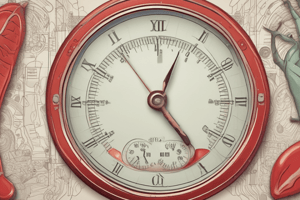Podcast
Questions and Answers
What is the medical term for high blood pressure?
What is the medical term for high blood pressure?
- Hypertension (correct)
- Hypotension
- Hyperglycemia
- Hyperthyroidism
What are the two components that make up a blood pressure reading?
What are the two components that make up a blood pressure reading?
- Diastolic rate and systolic rate (correct)
- Heart rate and cholesterol level
- Heart contraction and blood vessel flexibility
- Blood volume and pulse strength
At what blood pressure level does hypertension become a hypertensive crisis?
At what blood pressure level does hypertension become a hypertensive crisis?
- 160/100 mm Hg
- 200/140 mm Hg
- 150/90 mm Hg
- 180/120 mm Hg (correct)
Which of the following is NOT a lifestyle factor that can contribute to hypertension?
Which of the following is NOT a lifestyle factor that can contribute to hypertension?
What are some symptoms of a hypertensive crisis?
What are some symptoms of a hypertensive crisis?
How is hypertension typically diagnosed?
How is hypertension typically diagnosed?
What lifestyle modifications can help manage hypertension?
What lifestyle modifications can help manage hypertension?
What can individuals do to prevent and reduce the risk of hypertension?
What can individuals do to prevent and reduce the risk of hypertension?
Which of the following is a common risk factor for hypertension?
Which of the following is a common risk factor for hypertension?
What is the significance of early detection in hypertension?
What is the significance of early detection in hypertension?
Which of the following is not a recommended lifestyle modification for managing hypertension?
Which of the following is not a recommended lifestyle modification for managing hypertension?
Study Notes
Hypertension: Understanding the Silent Killer
Hypertension, also known as high blood pressure, is a serious medical condition that affects millions of people worldwide. It is characterized by persistently high pressure in the blood vessels, which can lead to various health complications if left untreated.
Understanding Blood Pressure
Blood pressure is the force exerted by blood on the walls of the arteries. It consists of two parts: systolic pressure, the pressure when the heart contracts, and diastolic pressure, the pressure between heartbeats. A normal blood pressure reading is typically below 120/80 mm Hg.
Symptoms of Hypertension
Most people with hypertension do not experience any symptoms, making it a "silent killer". However, when blood pressure reaches about 180/120 mm Hg, it becomes a hypertensive crisis, which can cause severe symptoms such as headache, nausea, vomiting, dizziness, blurred vision, nosebleeds, heart palpitations, and breathlessness.
Causes of Hypertension
Hypertension can be caused by a combination of environmental and genetic factors. Lifestyle factors such as obesity, physical inactivity, smoking, and alcohol intake can contribute to the development of hypertension. Non-modifiable risk factors include a family history of hypertension, age over 65 years, and co-existing diseases such as diabetes or kidney disease.
Diagnosis and Management of Hypertension
Hypertension is typically diagnosed through a simple blood pressure check. If diagnosed, treatment may involve lifestyle modifications, such as maintaining a balanced diet, regular exercise, and smoking cessation, as well as medication if necessary.
Prevention and Reduction of Risk
To prevent and reduce the risk of hypertension, individuals can adopt a healthy lifestyle that includes a balanced diet, regular exercise, and avoidance of tobacco and excessive alcohol consumption. These measures are particularly important for those with unmodifiable or hereditary risk factors.
In summary, hypertension is a serious condition that can lead to various health complications. It is often asymptomatic, making early detection and prevention crucial. By understanding the causes and risk factors, individuals can take steps to reduce their risk and maintain optimal blood pressure levels.
Studying That Suits You
Use AI to generate personalized quizzes and flashcards to suit your learning preferences.
Description
Learn about the silent killer - hypertension, also known as high blood pressure. Understand the symptoms, causes, and management strategies to prevent and reduce the risk of this serious medical condition.




